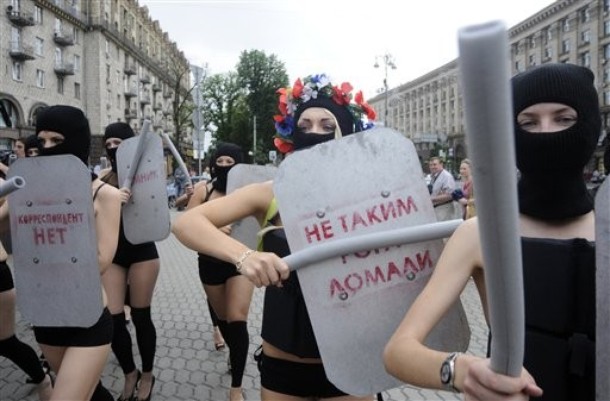
I see that Adrian Karatnycky, author of "Orange Peels," asks us to take a close look at the pattern of behavior exhibited by the Yanukovych administration over the past half year. Upon doing so, he says in reply to recent critical discussions of his piece, we will see that Ukrainians are "tired of protesting" (but that they still possess the inalienable right to demonstrations) , we will also see that a lot of Ukrainians are happy with Yanukovych, etc.
Let’s consider an opposing perspective, that of one of Ukraine’s leading human rights advocates. Yevhen Zakharov is the head of the Ukrainian Helsinki Human Rights Union and co-chair of the Kharkiv Human Rights Group. Zakharov is arguably one of Ukraine’s leading human rights monitors. He believes that there is considerable evidence that the new administration is using the Interior ministry to impose authoritarian controls on Ukraine; he also notes that these actions are in violation of Ukrainian law (we can add, these actions also contradict Ukrainian obligations under its international human rights treaties).
Zakharov finds that a disturbing reversal of the Internal Affairs Ministry’s prior stance on human rights has come about since the election. Zakharov makes a sound and very convincing case for viewing the state as having undertaken an authoritarian crackdown on basic civil liberties.
I would be interested in hearing more from Adrian or others who view the Yanukovych administration’s human rights record with favor. Zakharov’s recent article in the Kyiv Post has me convinced otherwise. Since his article provides evidence suggesting that we should not buy Karatnycky’s argument that democracy is not in peril, I will here sum up the main points Zakharov makes.
1. The current minister appears to have closed off access points human rights groups were using to monitor the behavior of the Internal Affairs Ministry. In 2005, within the Internal Affairs Ministry a Public Council on Human Rights was created under then-Internal Affairs Minister Yuriy Lutsenko, co-chaired by Zakharov. He states that this body regularly met and did a great deal of work over the past 5 years, but it has not been permitted to meet since Anatoly Mohylyov became the new Internal Affairs minister.
2. A recent directive increases the powers of Internal Affairs Ministry officials by calling for “constant control over the stay of foreign nationals on service structures, carr[ied] out [through] thorough checks of foreign nationals’ documents, giv[ing] particular attention to whether they have registration cards issued by border guards.”
Zakharov points out that this order is in violation of existing laws, which forbids such categorical surveillance. It also helps to place the detention of Nico Lange into a broader perspective (Lange, a political scientist who leads the German-based Konrad Adenauer Foundation in Kiev, was detained in Kyiv Airport after having written a piece critical of the current authoritarian crackdown in Ukraine – Karatnycky calls his detention an isolated incident). As Oxana Shevel notes (in an accompanying piece on this website), we can see that Lange’s detention is no isolated incident but rather, part of a broader policy of using state surveillance against foreigners.
3. A new directive restricts freedom of movement and introduces Soviet style surveillance: according to Instruction No. 292 from April 23, railways are to re-introduce obligations that ticket sales require passengers to provide full names, dates of birth, and the number of a person’s ID. Such data were in the Soviet era commonly used against groups or persons critical of the government. This type of surveilance is in violation of rights to privacy and reintroduces state surveillance over one of Ukraine’s most common forms of public transportation.
Broadly, Zakharov makes a case that gross violations of the right to peaceful assembly have been observed on a staggering scale and are the subject of considerable discussion in the media. He points out that some 350 articles have appeared in the media criticizing how the police handled peaceful gatherings of citizens concerned about state actions. In other words, in less than half a year, more media criticism of state repression of public demonstrations has appeared than in the three previous years (2007, 2008, 2009). He also expresses concern over recent evidence of a resurgence in violence used against detainees ("From June 11-14 alone, four deaths were reported as a result of police actions. Another victim ended up in emergency care.")
Zahkarov provides credible examples of systematic human rights violations resulting from the Internal Affairs Minister’s own new policies and troubling signs that the Ukrainian state is using the police once again to impose "new" (Soviet style) forms of surveillance over citizens as well as foreign nationals, thus inhibiting freedom of movement, freedom of expression and freedom of assembly. Why would he write this if everything was good with the state of democracy in Ukraine?
Alexandra Hrycak is professor of sociology at Reed College in Portland, OR. She has conducted research on gender and democratization in Ukraine. Photo credit: AP.
This article is part of the series Ukraine Under Yanukovych: An Analytical Debate. To find a series description and links to related articles, please click here.
Image: Ukraine%20media%20protest%20Jun%202010.jpg
